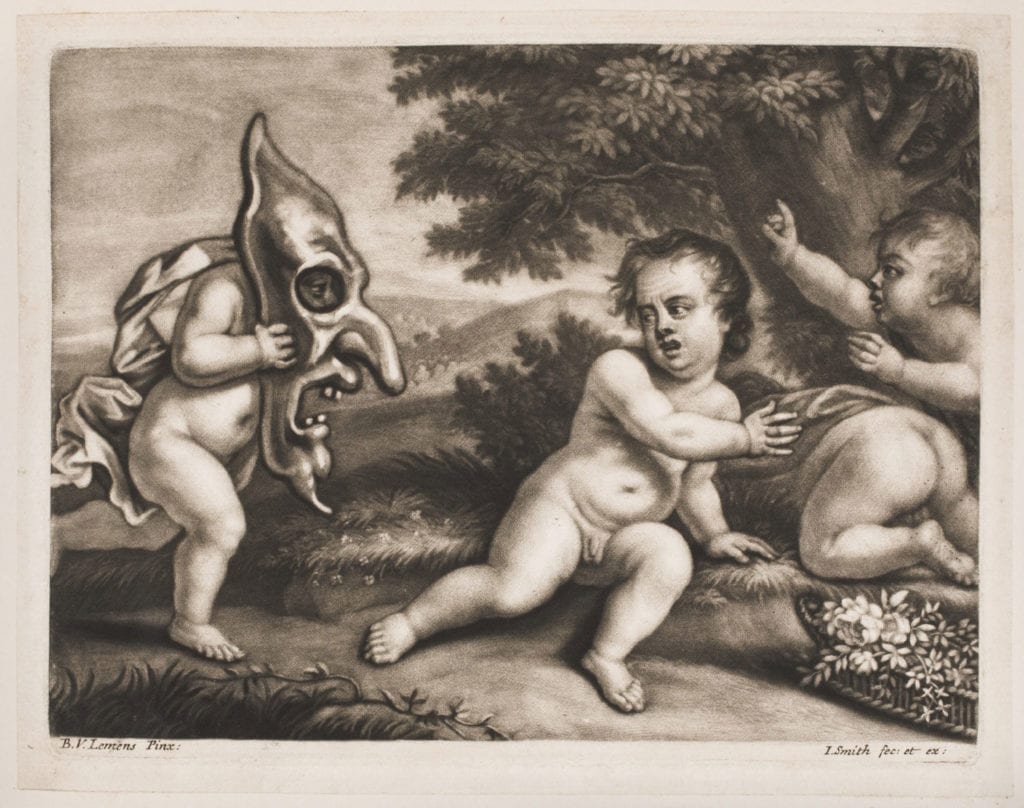Brianna Rossiter
Pittsburgh, Pennsylvania, USA
 |
| Children Playing with a Mask by John Smith. After Balthazar van Lemens. 1703. Philadelphia Museum of Art. |
We stood surrounding her tiny body in the hospital bed. Her shallow breaths were splinted by pain as we watched, myself and four second-year, male medical students. Her breath would catch and I wondered if she would disappear into the oblivion of the hospital matrix, her diseased bones and metastasized lungs dispersing necrotic tissue into the vents, between lines and tubes.
She looked at us expectantly. I had come by earlier, asking for permission to bring my students. It felt wrong to bother her, but her timid, warm smile beckoned from the door, and told me she was willing. In her most humbled state, ravaged by disease, she agreed to see our medical students; she would be honored to teach them, to teach me.
The students were not yet accustomed to a hospital room, its narrow alleys and snug corners. Their healthy bulk balanced the room against our patient’s frailty in an almost tactile way. I was also unaccustomed to my new role as teacher. My comfort zone ended at practicing independently and teaching on the fly while managing a medical team as a resident. Teaching in a formalized course was new to me; but here I was, in charge, with five pairs of eyes staring at me, expecting something. Expecting the differential diagnosis of a pulmonary embolism, the prognosis for stage four breast cancer, the pathophysiology of malignancy-associated hypercalcemia, a tutorial on lung percussion.
As I stood there, my teaching points were flooded by doubts. Who was I to teach this disease and its ugly symptoms, treatments, and prognosis? My fingers are still clinically young; am I actually feeling that hum of percussed lungs, that thrill at the leftmost clavicular edge? Had I missed something on that differential; will they go home and look it up, correcting me in their minds? Who am I to touch and teach about this most sacred body; this veteran, a woman, mother, daughter, sister, who looks at me with trust?
One medical student glosses over her history and I nod, already knowing this information. Although her life story is unique, filled with adventures I cannot imagine, her clinical course is not: late-stage breast cancer with metastases to bone and lung, complicated by a pulmonary embolism, necessitating that we thin her blood and watch her struggle to breathe in this hospital bed. I sanitize my hands and my students automatically follow suit. I turn to our patient; she is shivering, which I had not noticed before. Her hair has all but fallen out, yet the curve of her profile, with jutting cheek and collar bones, is set with dignity.
I hesitate as I walk over to her bed, thinking of my own failures and mistakes, ones that I would never want others to know. I wonder if it is because I am fresh out of residency, new to this role of attending. Or maybe it is because I am a woman, still sifting my way amongst the micro-aggressions of medicine. There has been a great deal discussed and published about “imposter syndrome,”1 but my mind knew this characterization before it came into vogue. I have carried my cloak of impostering through college, medical school, and residency. And I know I am not alone; many of us have subconsciously worn this self-doubt for some time, lessening our successes and feeding our failures.
I asked for permission and then untied her hospital gown to expose her back, riddled with jutting rib bones and bruises from thinned blood. As I move closer to listen to diseased lung fields, my medical students wait in line behind me, stethoscopes out, copying my every move.
And in that cold hospital room, on an uncomfortable bed, with five pairs of eyes staring, monitors beeping — her gown fell forward. Exposing her mastectomy scars, her sagging, shivered skin, she remained uncovered, her gown lying on the bed. And as my medical students jumped to block the door, to ensure the drapes were closed and her body shielded with their healthy bulk, I stood. There within my years of self-doubt and ongoing insecurities, she sat — in her humility, her grace, her un-impostering.
Reference:
- Koven, Suzanne. “Letter to a Young Female Physician”. New England Journal of Medicine, Perspective 2018; 376(20): 1907-1909.
BRIANNA ROSSITER is currently a general internal medicine fellow at the University of Pittsburgh Medical Center obtaining her master’s in education. Her medical education research interests include utilizing narrative writing as a way to increase trainee empathy, decrease burnout, and provide a mechanism for physician self-reflection. This narrative piece speaks to her insecurities in this new role as an attending. Given the increasing characterization of the so-called “Imposter” syndrome, she feels this piece will resonate with readers.
Highlighted in Frontispiece Volume 12, Issue 1 – Winter 2020
Winter 2019 | Sections | Doctors, Patients, & Diseases

Leave a Reply